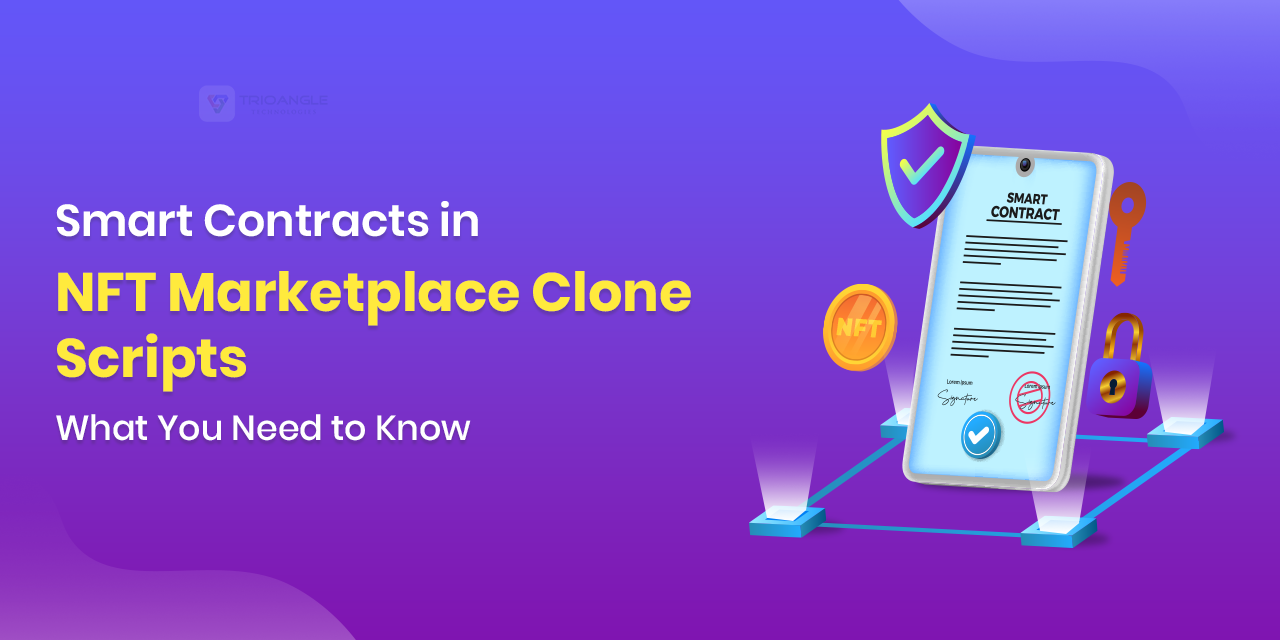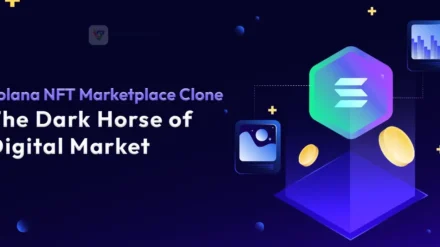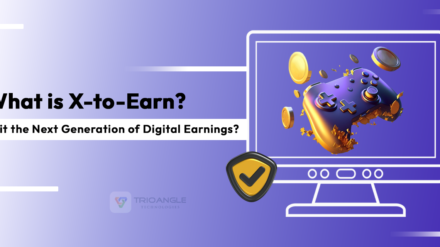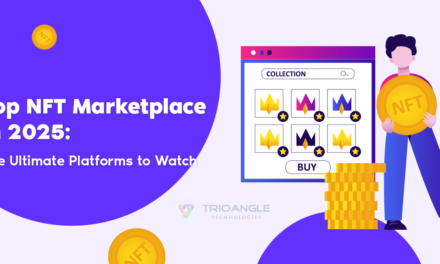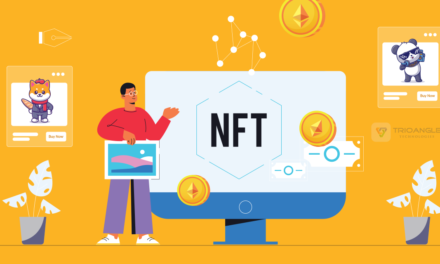Behind every successful NFT marketplace isn’t just a beautiful interface… It’s a smart contract doing the heavy lifting. Whether you’re building with an NFT Marketplace Clone Script or starting from scratch… the real value lies in how your Smart Contracts in NFT Marketplace work.
From creator royalties to gas-optimized trades and secure ownership transfers… smart contracts define trust and automation.
This blog pulls back the curtain on NFT Smart Contract Development… busting myths and breaking down tech in plain language. If you’re serious about launching an NFT Marketplace Script with Smart Contract… this guide is your competitive edge. Let’s dive in.
The Real Role of Smart Contracts in NFT Marketplace Clone Scripts
In the world of NFT Marketplace Clone Scripts, smart contracts are the silent engines. They go far beyond minting.
They shape how the entire marketplace behaves… Who gets paid, how royalties are distributed, and how secure each transaction is.
This is not a simple plug-and-play feature. It’s the core logic that drives trust and automation.
Even in clone scripts, smart contracts are fully customizable. You can tweak royalty logic, build custom auction flows, or add dispute resolution… all powered by Solidity Smart Contracts in NFT systems.
The smart contract defines what’s “on-chain”: minting, transfers, royalties, and payments. Everything else, like UI, search, and metadata, is handled off-chain by the NFT Marketplace Backend Script.
A common myth?
That “clone” means basic or rigid. Not true. A good NFT Marketplace Script with Smart Contract supports deep customization and scaling. Want multi-wallet support? You can code that. Need flexible NFT Contract Standards support? You got it.
Smart contracts make the marketplace secure, trustless, and self-executing. Combined with strong NFT Clone Script Security… They form the true foundation of a blockchain-powered NFT marketplace script.
In short, smart contracts are not extras… they are the heart of any serious NFT marketplace development script.
Benefits of Using Smart Contracts in NFT-Marketplace Clones
Smart Contracts in NFT Marketplace clones do more than automate tasks… they shape how your business operates, scales, and earns trust.
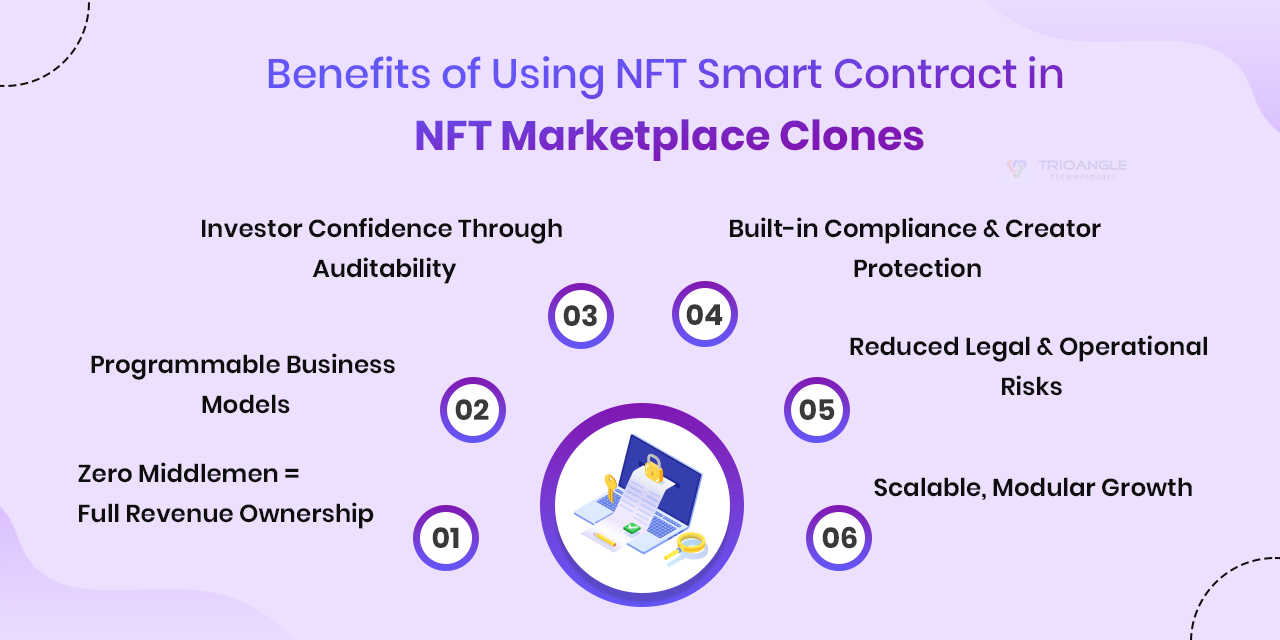
Zero Middlemen = Full Revenue Ownership
When you launch with a NFT Marketplace Script with Smart Contract. You cut out intermediaries. Smart contracts automate trades, payouts, and verifications. without relying on banks, agents, or even your own team. That means lower operational costs and better profit margins from day one.
Programmable Business Models
Want to charge dynamic platform fees? Split revenue with co-creators? Automate premium features? Through NFT Smart Contract Development, your business logic lives on-chain. You don’t need to rewrite backend logic. just deploy updated contract modules. It’s business agility at a smart-contract speed.
Investor Confidence Through Auditability
Smart contracts make your platform transparent. Every transaction is public, verifiable, and traceable. This isn’t just a tech feature, it’s a credibility tool. For startups, this builds serious trust with users and potential investors.
Built-in Compliance & Creator Protection
By using standards like ERC-2981 or customizing NFT Contract Standards… You ensure creators are paid on every resale. That’s not just good ethics… It’s a creator magnet. Platforms built with NFT Marketplace Development Script that respect creator rights grow faster and keep top talent.
Reduced Legal & Operational Risks
Since smart contracts enforce platform rules automatically, disputes and chargebacks drop. You can prove what happened, when, and why due to Solidity Smart Contracts in NFT tied directly to blockchain. It’s like having a legal contract that self-executes and never forgets.
Using upgradeable proxy patterns and modular design.. your clone script’s smart contracts evolve with your business. Add staking, lending, or cross-chain features without downtime. and without rewriting your NFT Marketplace Source Code or entire backend.
Smart contracts aren’t about code, they’re about control, flexibility, and long-term business resilience. If you’re serious about launching a scalable, trustable, and investor-ready NFT platform… Building with a Blockchain-Powered NFT Marketplace Script and strong smart contracts isn’t optional, it’s foundational.
Under the Hood – Smart Contracts in NFT-Marketplace Clone Scripts
Understanding how Smart Contracts in NFT Marketplace clone scripts are structured… is key to building secure, scalable, and customizable platforms.
Below is a clear breakdown of how it works:
Modular Smart Contract Layers
- NFT Token Standards:
Clone scripts support widely used token types… like ERC-721, ERC-1155, and emerging ones like ERC-6551. These define ownership, transfers, and batch minting logic. - Marketplace Logic Contracts:
Functions like listing, buying, bidding, and cancelling orders are managed here. These are the core of the NFT Marketplace Smart Contract Features that drive automated transactions. - Royalty & Payout Contracts: Most scripts implement ERC-2981 to automate royalties. Custom logic can be added to define multi-party payouts or tiered earnings per sale.
- Access Control & Upgrades: Security and flexibility are handled using OpenZeppelin’s Access Control… and Upgradeable Proxy Patterns. These tools allow future updates without changing the entire contract… Crucial for strong NFT Clone Script Security.
Integration Stack with Clone Script
- Frontend Integration (React/Next.js):
User interactions are routed to smart contracts via Web3 libraries like ethers.js. The UI talks directly to the Smart Contract for the NFT Marketplace. - Backend Support (Node.js, Express, GraphQL):
Backend scripts handle off-chain tasks like metadata indexing, notifications, and user management… Completing the NFT Marketplace Backend Script. - Decentralized Storage (IPFS/Arweave):
Clone scripts integrate these tools to store NFT metadata securely. This ensures that on-chain links always point to verified, tamper-proof content. - SDKs and Wrappers:
Many NFT Marketplace Development Scripts use wrappers or SDKs to simplify smart contract communication, making integration faster and more reliable.
How to Choose a Clone Script with Smart Contract Capabilities
What Every NFT Entrepreneur Must Know Before Choosing a Clone Script
Smart Contracts in NFT Marketplace clones are the real game-changers. But not all clone scripts are built equal. Some give you long-term flexibility, others leave you boxed in. Here’s how to choose wisely.
Open Source vs Proprietary Contracts – Which is Safer?
- Open Source Clone scripts with open-source NFT Marketplace Smart Contract Features let you inspect, audit, and change code. That gives transparency and control. If your team has Solidity experience or plans to scale with full ownership, this is ideal. Yet, open source may lack dedicated support and updates.
- Proprietary smart contracts are offered by vendors who manage the NFT Smart Contract Development for you. You get quick deployment, updates, and support. But always ask can you customize it later? Does the vendor allow access to the NFT Marketplace Source Code? Avoid getting locked into rigid systems that block future growth.
Launch your NFT marketplace with Battle-Tested Smart Contracts!!!
7 Must-Have Smart Contract Features to Look For
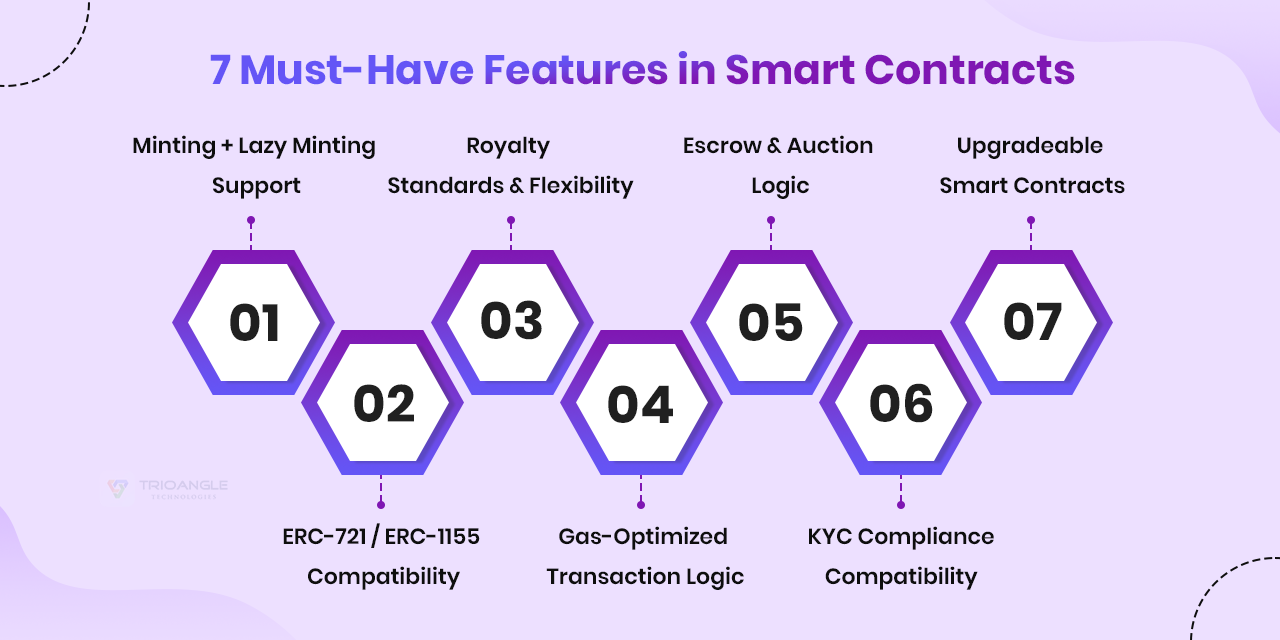
Minting + Lazy Minting Support
Basic minting lets users create NFTs on-chain immediately. But lazy minting delays this until the NFT is purchased, saving gas costs for creators. This is critical in today’s gas-sensitive environment.
A well-structured NFT Marketplace Development Script should support both modes. This gives users flexibility and lowers barriers to entry. Especially for new artists or collectors testing the platform.
ERC-721 / ERC-1155 Compatibility
Smart contracts must align with widely accepted NFT Contract Standards. ERC-721 supports unique NFTs. ERC-1155 allows semi-fungible and batch minting, ideal for games or collectibles with variants.
Having both makes your platform versatile. It allows you to target a wider user base, from digital art to GameFi to virtual assets.
Royalty Standards & Flexibility
Royalties are how creators earn passively from resales. A good Smart Contract for the NFT Marketplace should implement ERC-2981. Or allow flexible royalty rules. Artists and creators now expect this by default. More importantly, customizable royalty logic (e.g., multiple recipients, tiered royalties). It is a big draw for onboarding Web3 creators.
Gas-Optimized Transaction Logic
Deploying and interacting with NFTs can be expensive. Look for a Blockchain-Powered NFT Marketplace Script that uses gas-efficient functions and optimized Solidity. Scripts bloated with unnecessary logic burn more ETH, scaring users away. Efficient contracts improve user experience and reduce drop-offs during checkout or minting.
Escrow & Auction Logic
Users should be able to list, bid, cancel. or claim NFTs securely without third-party interference. Escrow logic ensures assets and funds are held safely during the transaction. Auction logic lets you offer timed sales, bids, and reserve price conditions. These features increase marketplace functionality and buyer trust crucial for scaling.
KYC Compliance Compatibility
Even though KYC usually happens off-chain. your smart contract should be able to plug into your NFT Marketplace Backend Script. or APIs to trigger identity-based logic (like allowing only verified wallets to mint or trade). This prepares your marketplace for jurisdictions with upcoming regulations. Especially for real estate or ticketing NFTs.
Upgradeable Smart Contracts
Web3 evolves rapidly. Hardcoded contracts get outdated. Look for scripts using upgradeable proxy patterns (like OpenZeppelin’s Transparent or UUPS Proxy). This lets you push updates or patches without redeploying everything. It’s a key feature in NFT Smart Contract Development if you want longevity and security.
Checklist: Is Your Clone Script Future-Ready?
Multi-Chain Support
- Your smart contract shouldn’t limit you to Ethereum.
- It should also support Polygon, Avalanche, BNB Chain, or even layer-2s like Arbitrum.
- Multi-chain support reduces transaction fees and attracts users from various ecosystems.
- Many smart clone scripts now come with modular support for different chains.
Cross-Platform NFT Compatibility
A NFT Marketplace Clone Script should allow listing and interacting with NFTs created elsewhere. This opens doors to aggregation models like OpenSea. It enhances discoverability and makes your platform more competitive in the long run.
Smart Contract Customization Options
A rigid contract limits innovation. Whether you want to add dynamic NFTs, soulbound tokens, or integrate staking… You need customizable smart contracts. The best NFT Marketplace Script with Smart Contract allows extensions, integration of new modules, and tweaks to logic. Ask your provider how modular their architecture is.
Case Studies – How Smart Contract-Backed Clone Scripts Create Real-World Value
When built into an NFT Marketplace Clone Script, they automate logic, reduce overhead, and create real-world impact across industries. Below are live scenarios showing how NFT Smart Contract Development shapes profitable outcomes.
Creator-Centric Marketplaces (Like Foundation)
Problem: Creators often lose control of royalties or depend on third-party platforms for revenue sharing.
Solution: Platforms like Foundation use Smart Contracts in NFT marketplaces to automate royalties on every resale.
Clone Script Impact:
If you use a NFT Marketplace Script with Smart Contract that includes royalty logic. (e.g., ERC-2981), you can go live with a creator-first marketplace quickly. This builds trust with artists and attracts loyal users. No manual tracking or late payments, it’s all coded. Your platform becomes a magnet for creators who want transparency and passive earnings.
Turn creativity into currency — explore the top-X-to-Earn models in NFTs!
Gaming NFTs (Like Axie Infinity Clones)
Problem: Web2 gaming relies on centralized control for assets, upgrades, and in-game currencies.
Solution: In Axie Infinity-style games, smart contracts handle NFT battles, breeding, rewards, and staking all on-chain.
Clone Script Impact:
With a NFT Marketplace Clone Script that includes built-in Solidity Smart Contracts in NFT, the game logic runs independently. No backend admin is needed to manage token rewards or character upgrades. Players trust the system, and developers save months of backend work. It’s a cost-effective way to enter GameFi without reinventing blockchain mechanics.
Tokenized Real Estate & Membership NFTs
Problem: Verifying real estate titles or managing exclusive memberships is slow and manual.
Solution: Through NFT Contract Standards, real estate titles and memberships can be tokenized, with ownership recorded on-chain.
“Wish to know how token development hits the mark in the NFT industry? Let’s dive into NFT Token Development with standard details.”
Clone Script Impact:
A Blockchain-Powered NFT Marketplace Script can tokenize property ownership or club memberships. For example, someone buying an apartment NFT receives legal rights embedded in the token. With NFT Smart Contract Development, you can also add token-gated access. This is useful for events, exclusive content, or luxury experiences, creating new monetization layers.
Conclusion
Smart contracts aren’t just code… they’re the backbone of trust, automation, and value in any NFT Marketplace Clone Script. For entrepreneurs, understanding how Smart Contracts in NFT Marketplace function… isn’t optional, it’s essential. From creator royalties to on-chain governance, these contracts unlock real business utility. Choosing the right NFT Marketplace clone Script with Smart Contract means more than launch speed. It’s about scalability, security, and future-proof flexibility. As NFT markets evolve, your edge lies in how smart your contracts are. Build with confidence. Build with clarity. And let your smart contracts do the hard work, so your platform thrives.

